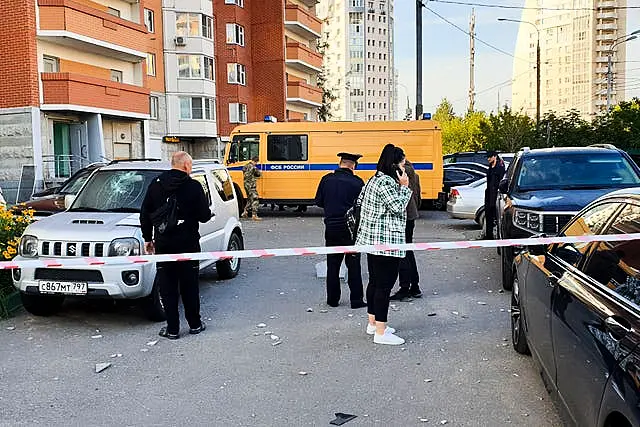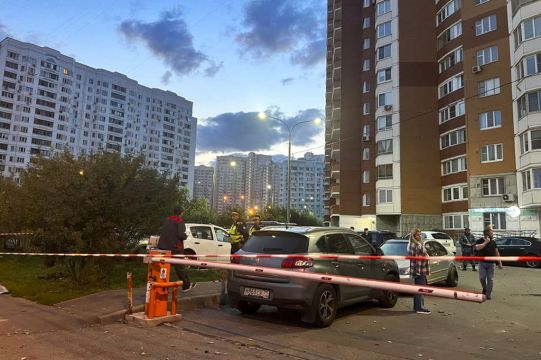Ukrainian saboteurs co-ordinated by Kyiv’s military intelligence services carried out a pair of recent drone attacks that hit parked bomber aircraft at air bases deep inside Russia, Ukraine media claimed on Tuesday.
The attacks on Russian airfields on Saturday and Monday destroyed two Russian bombers and damaged two other aircraft, according to Ukrainska Pravda, as the war approaches its 18-month milestone.
That newspaper and Ukraine’s NV news outlet said groups of saboteurs were behind the strikes. It was not possible to verify the claims on the ground.

Ukrainian media attributed two attacks to the saboteurs – a strike Saturday on the Soltsy air base in the Novgorod region in north-western Russia, about 360 miles (700km) north of the Ukrainian border, and Monday’s strike against the Shaikovka air base in the south-western Kaluga region which is about 180 miles (300km) north-east of the Ukrainian border.
Ukrainian military intelligence spokesman Andriy Yusov told the Ukrainian LIGA.net news outlet on Monday that at least one Russian warplane was damaged in the attack on Shaikovka.
He said it was carried out by people who worked in close coordination with Ukrainian military intelligence but gave no further details.
The Russian Defence Ministry said the attack on Soltsy damaged one aircraft. It did not comment on the reported attack on Shaikovka, but Russian media did.

Ukraine has been seeking to take the war into the heart of Russia since earlier this year.
It has increasingly targeted Moscow’s military assets behind the front lines in eastern and southern Ukraine and at the same time has launched drones against Moscow, most recently early on Tuesday.
Kyiv is also trying to keep up the pressure on the Kremlin along multiple fronts, pursuing a counter-offensive at various points along the 900-mile (1,500km) front line, as well as diplomatically by obtaining pledges of more weaponry from its Western allies, including F-16 warplanes.
Ukraine’s deputy defense minister Hanna Malyar said on Tuesday that the Ukrainian military have entered the south-eastern village of Robotyne in the frontline Zaporizhzhia region and were coming under continuous shelling by Russian forces.
Some previous Ukrainian attacks on Russian air bases involved Soviet-designed drones powered by turbojet engines. They have a range of up to 600 miles (1,000km). But the strikes in recent days apparently used primitive small drones, which would corroborate the possibility that they were launched by saboteurs.

Also on Monday, a Russian pensioner walking in a forest about 370 miles (600km) north of the Ukrainian border came across the remains of a drone painted in the blue and yellow colours of the Ukrainian flag.
Pictures shared on Russian social media channels show that the drone had “Glory to Ukraine” inscribed on a broken wing and “Glory to the heroes” written on the other wing, the Russian telegram channel Baza said on Tuesday.
Meanwhile, a recent spate of drone attacks apparently targeting Moscow continued early on Tuesday but were thwarted by Russian air defence systems, Russia’s Ministry of Defence said.
However, falling wreckage of one drone shattered an apartment building’s windows and damaged vehicles in Moscow’s western suburbs.
There were no reports of injuries in the latest drone attacks that Russia blamed on Kyiv.

Though the drone attacks on Russian soil have occurred almost daily in recent weeks, they have caused little damage and there have been no casualties.
Flights at several Moscow airports were temporarily suspended on Tuesday as a security precaution amid the attacks, authorities said.
Two other drones were jammed and crashed in the western Bryansk region bordering Ukraine, the defence ministry said.
Ukraine has not acknowledged responsibility for the attempted drone strikes, nor have senior Russian leaders made any comment about the development.
Russian President Vladimir Putin is due to speak via video-link at a meeting this week in Johannesburg of leaders from Brazil, Russia, India, China and South Africa.
He is under threat of arrest if he travels abroad due to an International Criminal Court arrest warrant and will not attend the so-called Brics talks in person.







